Leonard Kamsler named inaugural recipient of PGA of America Lifetime Achievement Award in Photojournalism
By Bob Denney, PGA Historian
Published on
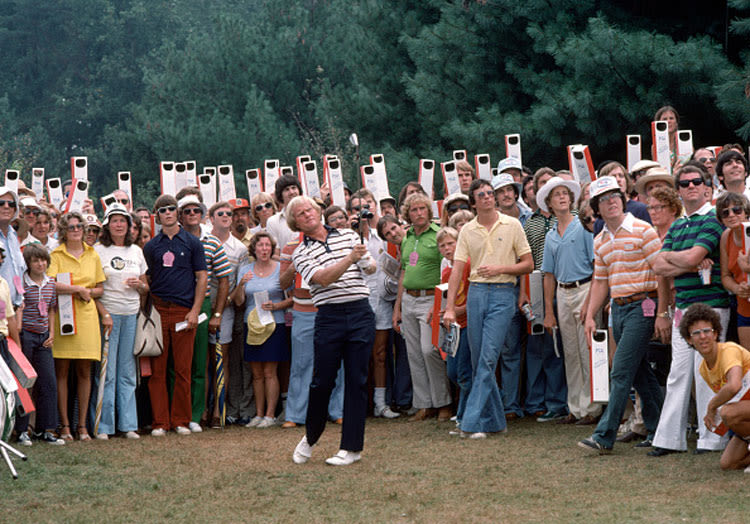
One of Leonard Kamsler's iconic photos of Jack Nicklaus at the 1979 PGA Championship Leonard Kamsler/Getty Images
PALM BEACH GARDENS, Fla. — Leonard Kamsler — the Dean of Golf Photography, whose pioneering efforts in motion interpretation of the golf swing resulted in many of golf’s legendary images — has been named the inaugural recipient of the PGA of America Lifetime Achievement Award in Photojournalism.
Recognizing the vital role that photography has in chronicling the rich history of golf, the PGA of America celebrates individuals who have promoted and honored the game by establishing the PGA Lifetime Achievement Award in Photojournalism.
Kamsler, 84, a resident of New York City, will be honored on May 13 – in conjunction with the 2020 PGA Championship at Harding Park in San Francisco.
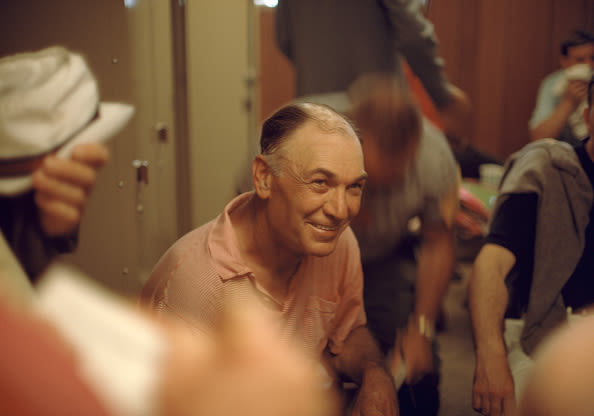
Ben Hogan speaking to the media in the locker room during the US Open at the Baltusrol Golf Club in Springfield, New Jersey, circa June 1967. (Photo by Leonard Kamsler/Popperfoto via Getty Images)
Born in Raleigh, North Carolina, and a 1957 graduate of Duke University, Kamsler grew up with two primary interests — photography and magic. At age 12, Kamsler received a movie camera from his father — and began developing his creative skills. Kamsler also learned that becoming a magician was a fragile career and began turning his attention to photography.
Kamsler’s drive to produce quality images resulted in an unprecedented study of the golf swing along with fascinating visuals of the game’s premier performers, eventually building an unparalleled library of more than 200,000 images. But prior to his becoming a freelance success in golf, Kamsler’s first job out of college was working under New York City photographer Milton Green, whose star client was film icon Marilyn Monroe.
From 1959 through 2019, Kamsler primarily worked for GOLF Magazine, and intermittently contributed to Golf Digest, Golf World, and PARGolf.
In addition to receiving the adulation of his peers, he also is a valued mentor to aspiring photographers.
While a student in art appreciation class at Duke University, Kamsler had an epiphany.
“I was in a class led by Professor W.K. (Bill) Stars,” said Kamsler. “He said to ‘exhaust the possibilities of whatever you do, take it all the way. I didn’t know at the time that I was finding the greatest thing that could happen to me. Professor Stars had a poster over his door with words I have never forgotten: ‘Will I Be a Teacher They Will Always Remember?’ ”
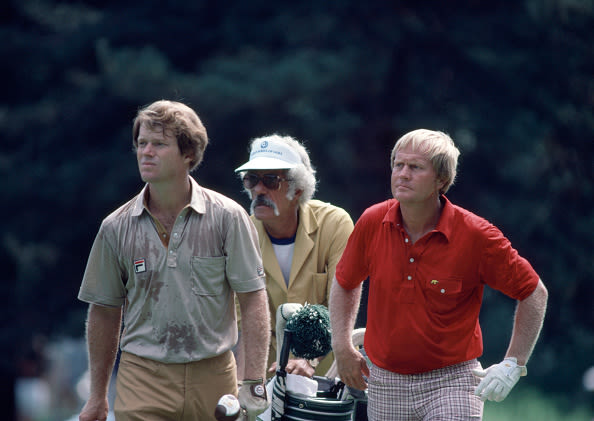
Tom Watson, Jack Nicklaus' caddy Angelo Argea and Jack Nicklaus during the PGA Championship at the Oak Hill Country Club in Rochester, New York, circa August 1980. Nicklaus won the tournament whilst Watson tied for 10th place. (Photo by Leonard Kamsler/Popperfoto via Getty Images)
“Leonard Kamsler’s legacy extends beyond talent and an eye for capturing the best in golf,” said PGA of America President Suzy Whaley. “His impact upon his profession extends for generations by the photographers that he took under his wing to give encouragement and guidance. The PGA of America is proud that Leonard is the first recipient of this award. His enthusiasm and quality of work covering this great game will remain the gold standard in photojournalism.”
Kamsler worked 40 consecutive Masters (from 1963 to 2002), and left his own indelible mark upon Augusta National Golf Club as the first to set up remote-control cameras behind holes 12 and 15. Kamsler also covered PGA Championships from 1965 to ’81, the 1963 Ryder Cup, the 1989 Open Championship and 22 U.S. Open Championships.
“When I got the call that I would receive this award, I was swept away,” said Kamsler. “I always felt that if I could help, I did. I didn’t feel threatened by others. Some don’t want to give others the time of day; they’re afraid that they would lose a dollar. I had clients that stuck with me and gave me a living.
“When I started freelancing, I found that you had to have a patentable idea to present to an employer. They were not easy to come up with.”
In 1957, Kamsler spent time with Professor Harold Edgerton of the Massachusetts Institute of Technology (MIT). Edgerton, nicknamed “Papa Flash,” was credited with transforming the stroboscope into a common device — the strobe light. From the time spent with Edgerton, Kamsler would go on to develop never-before-seen angles and effects in photography.
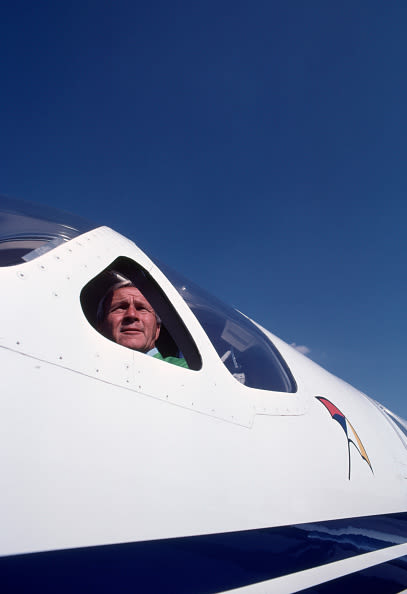
Arnold Palmer in the cockpit of his Cessna Citation private jet in Latrobe, Pennsylvania, circa 1982. (Photo by Leonard Kamsler/Popperfoto via Getty Images)
He worked with a Hulcher 35mm camera, manufactured in Hampton, Virginia, with the capacity to fire 75 frames per second. Kamsler used the legendary Hasselblad camera for portraits and set-up photography.
Kamsler’s collection of more than 400 golf swing sequences is a rapid-fire gallery highlighted by golf legends from Sam Snead, Tony Lema, Arnold Palmer and Jack Nicklaus to Johnny Miller, Mickey Wright, Kathy Whitworth and Tiger Woods.
Additionally, Kamsler’s eye for detail and skill in lighting enabled him to branch into freelance stints with the Harlem Globetrotters overseas, and to Las Vegas to work with Siegfried & Roy, Disney on Ice and the Ringling Bros. and Barnum & Bailey Circus.
His ability to capture personalities with his camera also made him the toast of country music lovers.
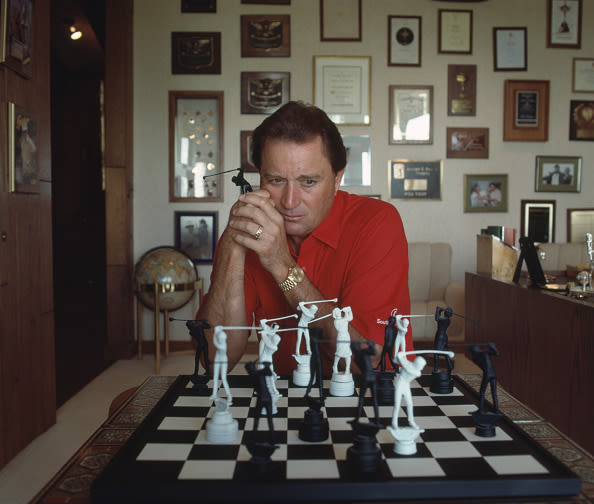
Raymond Floyd contemplating his next move at a chess set with golfers as chess pieces at his home, circa 1989. (Photo by Leonard Kamsler/Popperfoto via Getty Images)
Beginning in the early 1970s, Kamsler spent a decade photographing many of the legendary performers in Nashville, Tennessee. His collection is now on display in the Country Music Hall of Fame and Museum. Twenty-five images were among a 2019 PBS documentary miniseries, “Country Music,” by award-winning filmmaker Ken Burns.
Said one industry admirer, Kamsler’s work “helped change the perception of country music.”
Through more than a half century of delivering captivating golf images, Kamsler’s proudest moment wasn’t the result of his lens.
Through more than a half century of delivering captivating golf images, Kamsler’s proudest moment wasn’t the result of his lens.
American and European golf photographers used to gather prior to the Ryder Cup for a match play competition that began in 1991 and has since been discontinued.
The prize in the “Kamsler Friendship Kup” was a statuette in the shape of a Buddha— bearing Leonard’s face.
